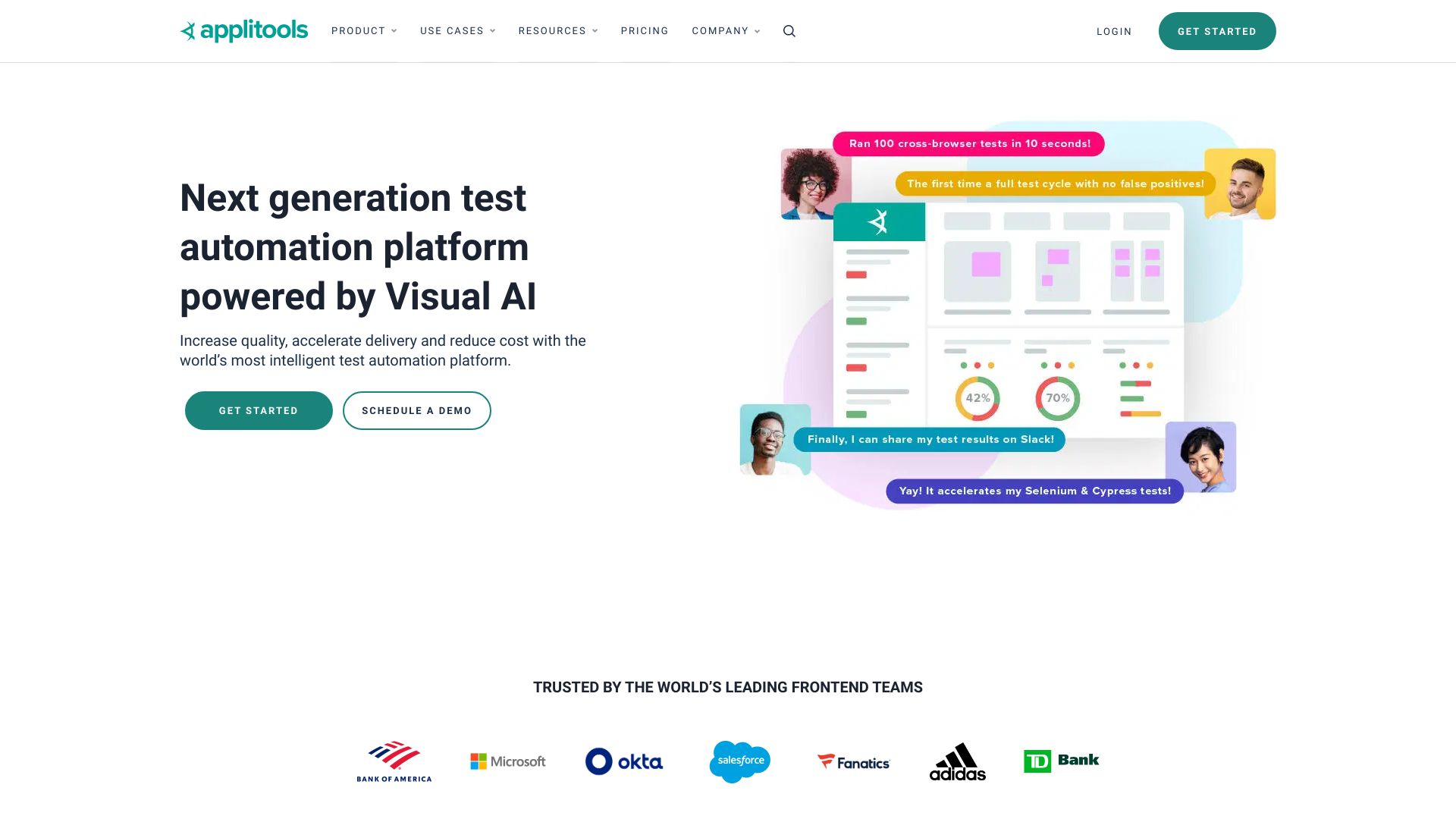- Home
- AI Image Recognition
- Applitools

Applitools
Open Website-
Tool Introduction:Visual AI + GenAI testing, no-code coverage, fewer false positives.
-
Inclusion Date:Oct 28, 2025
-
Social Media & Email:
Tool Information
What is Applitools AI
Applitools AI is an end-to-end software testing platform that blends Visual AI, GenAI-assisted authoring, and no-code workflows to scale quality across web and mobile apps. It enables teams to create, validate, execute, and analyze tests spanning visual, functional, API, accessibility, and cross-browser/device scenarios. By comparing application states like a human, its Visual AI detects layout and content regressions while reducing flaky failures and false positives. Centralized analytics, smart maintenance, and broad framework integrations help teams cut costs, expand coverage, and ship higher-quality releases faster.
Applitools AI Key Features
- Visual AI regression detection: Human-like validation of UI, layout, and content changes to catch issues traditional locators miss.
- GenAI-assisted authoring: Generate and refine tests from intent, helping teams ramp faster and reduce manual scripting.
- No-code and low-code test creation: Build tests via a visual editor to enable QA, product, and non-technical stakeholders.
- Functional and API testing: Validate business logic and service contracts alongside visual checks for end-to-end coverage.
- Accessibility testing: Detect accessibility violations to support inclusive experiences and compliance goals.
- Cross-browser/device coverage: Execute tests at scale across browsers, viewports, and mobile devices in the cloud.
- Smart maintenance: Auto-healing locators, baseline management, and deduplication to reduce flaky tests and review time.
- Test analytics and dashboards: Centralized insights into trends, failures, and quality signals to prioritize fixes.
- CI/CD and framework integrations: Works with Selenium, Cypress, Playwright, WebdriverIO, Appium, and popular pipelines.
- Parallel execution at scale: Run suites in parallel to shorten feedback cycles and accelerate release cadence.
Who Should Use Applitools AI
Applitools AI suits QA engineers, SDETs, developers, and release managers who need reliable visual and functional coverage with minimal maintenance. it's valuable for product teams validating UI/UX changes, mobile and web teams targeting multiple browsers/devices, and organizations in e-commerce, fintech, SaaS, media, and other domains where UI quality and accessibility are critical.
How to Use Applitools AI
- Sign up and create a workspace for your application and team.
- Install the SDK for your test framework (e.g., Selenium, Cypress, Playwright, Appium) or open the no-code editor.
- Author tests using GenAI assistance or record flows; add visual, functional, API, and accessibility checks.
- Configure cross-browser/device targets and parallel execution settings in the cloud.
- Run tests locally or via CI/CD; capture baselines for approved application states.
- Review results in dashboards, compare diffs, approve or reject changes, and manage baselines.
- Integrate with pipelines and notifications to automate continuous testing and monitoring.
Applitools AI Industry Use Cases
E-commerce teams detect subtle layout shifts and broken promotions across browsers before major sales events. Financial services validate secure workflows and accessibility in authenticated user journeys. SaaS platforms safeguard rapid UI iterations with Visual AI to cut flaky failures. Media and content sites ensure responsive layouts render correctly across devices. Mobile app teams combine functional and visual validation to protect critical user flows during frequent releases.
Applitools AI Pricing
Applitools AI is offered via tiered subscription plans for individuals, teams, and enterprises, with access to core features and advanced capabilities based on plan level. A free trial is typically available so teams can evaluate Visual AI, cross-browser/device execution, and analytics in their own pipelines. For detailed pricing, feature availability, and custom enterprise options, contact the vendor or request a quote.
Applitools AI Pros and Cons
Pros:
- Visual AI reduces false positives and catches UI issues missed by traditional selectors.
- GenAI and no-code tools speed up authoring and broaden team participation.
- Scalable cross-browser/device execution shortens feedback cycles.
- Smart maintenance and baseline management lower test flakiness and review time.
- Rich analytics and CI/CD integrations fit modern DevOps workflows.
Cons:
- Subscription cost may be higher than basic open-source stacks for small teams.
- Baseline review and visual auditing add process overhead if not well managed.
- Cloud-based execution depends on network reliability and governance constraints.
- Adoption may require cultural change from code-only testing to visual-first practices.
Applitools AI Popular Questions
-
What types of testing does Applitools AI support?
It supports visual, functional, API, accessibility, and cross-browser/device testing for web and mobile applications.
-
Which frameworks and languages are compatible?
Applitools integrates with popular tools such as Selenium, Cypress, Playwright, WebdriverIO, and Appium across common programming languages.
-
How does Visual AI reduce false positives?
It evaluates pages like a human would, tolerating inconsequential rendering noise while flagging meaningful visual differences, which cuts flaky failures.
-
Can I combine visual checks with functional and API assertions?
Yes. You can add functional validations and API assertions alongside visual snapshots to cover end-to-end user flows.
-
Does it work in CI/CD pipelines?
Yes. It integrates with major CI/CD systems, enabling parallel execution, environment targeting, and automated result reporting.
-
How are baselines managed across branches and releases?
Baselines can be versioned and reviewed so teams approve intended changes, keep history, and align visual expectations per branch or release cycle.




